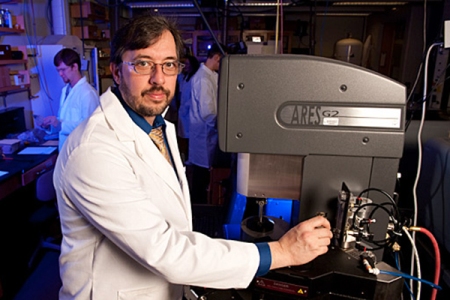The National Institute of Standards and Technology (NIST) has awarded the University of Delaware’s Center for Neutron Science $7 million for continued neutron scattering research.
 UD's Norman Wagner is principal investigator on a neutron scattering research project that has received a $7 million National Institute of Standards and Technology grant.
UD's Norman Wagner is principal investigator on a neutron scattering research project that has received a $7 million National Institute of Standards and Technology grant.
Neutron scattering is a nanoscale measurement technique similar to X-ray and light scattering that is used to examine a material’s structure at the molecular, nano- and meso-scales. The technique is useful in engineering new nanomaterials for grand-challenge problems ranging from energy storage to biomaterials for improving human health.
The project is a collaborative effort between UD and NIST’s National Center for Neutron Research (NCNR) to develop new methods to investigate nanoscale materials, work that builds upon a five year relationship between the two entities.
“UD’s extensive track record of collaborative research, publication and joint teaching with NCNR exemplifies our leading role as the premier group using neutron scattering methods to investigate nanoscale materials,” said Norman J. Wagner, Alvin B. and Julia O. Stiles Professor of Chemical Engineering and director of UD’s Center for Neutron Science, and principal investigator on the project.
Co-principal investigators are Raul Lobo, professor of chemical and biomolecular engineering and director of the Center for Catalytic Science and Technology; Darrin Pochan, UD professor of materials science and engineering; Thomas H. Epps, III, Thomas and Kipp Gutshall Associate Professor of Chemical and Biomolecular Engineering; and Christopher Roberts, associate professor of chemical and biomolecular engineering.
UD researchers will develop new and novel sample environments for examining materials under applied fields, along with advanced theoretical methods to analyze experimental results. Research will focus on condensed matter physics, colloid and polymer science, and proteins and nanoparticles.
In particular at UD, the Pochan group will investigate biomaterials for controlled drug release. The Epps research group will study block copolymer thin films for membranes, optoelectronics and self-cleaning coatings, while the Roberts research group will explore the stability of proteins and protein aggregation related to biopharmaceuticals. Additionally, the Lobo research group will explore nanostructured materials for carbon sequestration and hydrogen storage, with applications in energy, and the Wagner group will develop new instrumentation for exploring complex fluids under flow to aid in the rational design of nanomaterials.
Working in concert with NCNR, UD’s computer engineering staff has already made significant contributions to the NCNR’s data acquisition software and will continue this work to develop next generation software under the five-year renewal. Select UD students, postdoctoral researchers and faculty will work on-site at NCNR during the project and will provide education and support to U.S. researchers using NCNR facilities.